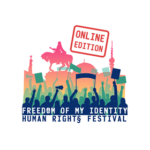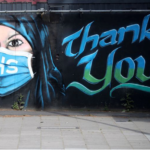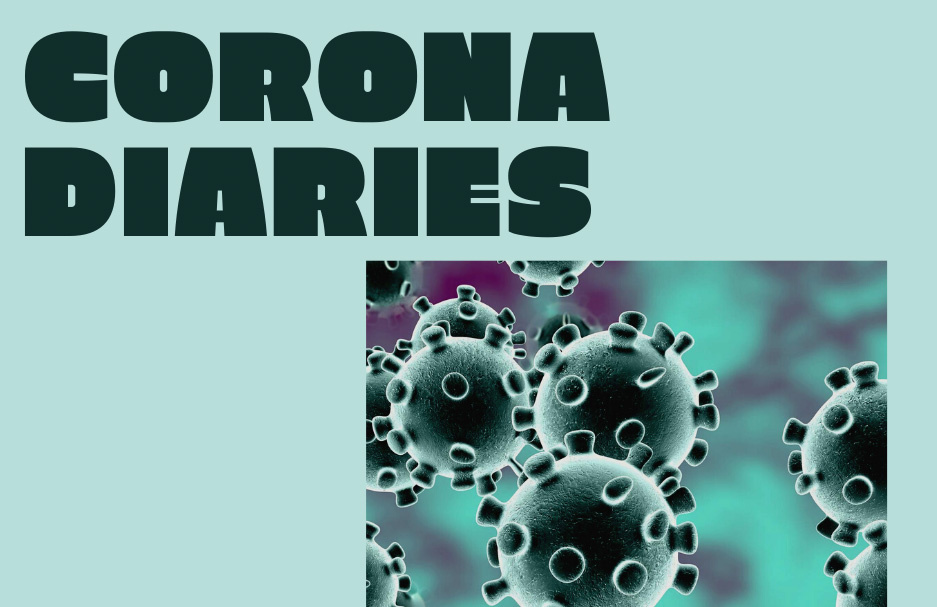
Corona Diaries: Voices from the ENAR network
The Covid-19 crisis is exacerbating structural racism and inequalities in society, with vulnerable and disadvantaged groups bearing the brunt of its impact.
Many ENAR members are doing their part to ensure that solidarity and justice are upheld. Read their ongoing concerns about the main emergencies during this crisis and their initiatives to move forward.
Regularising a few in order to keep the system unequal – Italy and the recent law on irregular migrants
Elizabeth Arquinigo Pardo, Razzismo Brutta Storia, Italy
29 May 2020
Ever since the Covid-19 outbreak in Italy, Razzismo Brutta Storia has aligned with a network of organisations that urged the national government to regularise undocumented migrants, with the campaign
Unfortunately, the law proposal which has been finally adopted by the government restricts the scope of the law to those who are essential for some economy sectors (agricultural and domestic workers). This law does not include all the (about) 700.000 undocumented migrants living in Italy but privileges those who are “useful” to current economic needs. The reasoning implied in this law goes back to the idea of a migrant as nothing more than a “commodity” whose presence in Italy is conditional to market demands. As this law does not change the national legal structure of institutionalised racism that both prevents people from coming legally to Italy and does not grant leave to stay to those who are already residing in the country, the network continues to call for a change to the law.
Razzismo Brutta Storia supports the agricultural workers’ strikes which have been led by workers’ rights activist and independent trade unionist Aboubakar Soumahoro to protest against the situation. The current pandemic has revealed the hypocrisy of the European migration system when the supply does not meet the demand for workforce and its tendency to deliberately privilege the rights of some while excluding the great majority. Other movements such as the international network “Papers for all”, which was initiated in Spain, are promoting protests to draw attention to what is and will be, if not tackled, a European issue. Razzismo è una Brutta Storia is advocating for change on a national level and supporting Paper for all in its mission to secure a leave to stay for everyone.
Supporting Muslim women to withstand the multidimensional and compounding impact of coronavirus
Sanja Bilic, European Forum of Muslim Women
8 May 2020
COVID 19 has dramatically changed the way we live – affecting all of us – as an affirmation of globalisation. However, the privilege of having comfortable, safe homes, food, modern amenities, technology and even the ability to socially distance is not equally accessible to all of us. COVID 19 has brought to the fore and amplified the existing problems faced by many marginalised communities in European societies: migrants, ethnic/religious/racial minorities, LGBT, poor and disabled.
Many organisations and institutions, including the UN, have highlighted the disproportional effect of the pandemic on women and girls around the world. Surges in domestic violence incidents, limited access to health and social services, employment issues – are just a few to mention.
European Forum of Muslim Women (EFOMW) is an umbrella organisation, representing 18 European Muslim women organisations. As such, we are acutely aware of the multidimensional and compounding impact of coronavirus on Muslim women. COVID 19 has had a huge impact on the way EFOMW works and communicates with its members. The changes in everyday life have increased women’s work burden as they are required to manage home and work responsibilities; this, in turn, has impacted women’s voluntary activities and their engagement with the organisations they represent. For Muslim women, due to Islamophobia and structural racism, this struggle is even more pronounced as they are more likely to experience inequalities related to health, access to public and social services and work.
We are now exclusively working online and trying our best to support and stay connected to our members during these challenging times. We do this by information sharing, focus on well-being and, of late, consultation on best practices to be shared between our members. We are also conducting a mini-consultation amongst the member organisations to understand the key issues they are facing due to COVID 19 and we are hoping to present these issues at the EU level next month.
Islamophobic hate speech, in both public and social media, connecting the spread of COVID19 and Muslims/Islam has gained prominence. A study conducted at Birmingham City University found that “the COVID-19 crisis has been used to create ‘others’ of Muslims blaming them for the spread of the virus… The rise of fake news and how social media spreads it has led to a lot of these myths produced by the far-right being spread to the point that some have made their way into mainstream media, despite being debunked.” For example, media articles with Muslim women wearing headscarves, Muslims praying and mosques are shown with entirely unconnected headlines discussing shop closures in Italy and the immigrant situation in Greece.
The coronavirus should not be yet another tool to separate communities when working together is needed more than ever. We need to challenge and call out any form of hate speech targeting Muslims and other marginalised communities.
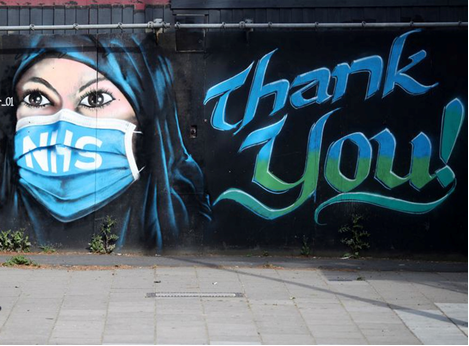 In this context, it is crucial that EU leaders represent the diversity of people living in the EU. This is particularly important in combating hate speech or speech that can lead to harm of inter-community/social relations during these difficult times. They need to focus on facilitating a positive and constructive dialogue and to nurture a tolerant and caring EU attitude, such as expressed by EU Commissioner for Equality, Helena Dalli, in her Ramadan message.
In this context, it is crucial that EU leaders represent the diversity of people living in the EU. This is particularly important in combating hate speech or speech that can lead to harm of inter-community/social relations during these difficult times. They need to focus on facilitating a positive and constructive dialogue and to nurture a tolerant and caring EU attitude, such as expressed by EU Commissioner for Equality, Helena Dalli, in her Ramadan message.
Strengthening solidarity and unity during the pandemic outbreak
Aidai Anarbek, Diverse Youth Network, Hungary
30 April 2020
The current pandemic outbreak has brought us to difficult times. Not only has it endangered global healthcare, but it has also induced a major political and democratic crisis in Hungary. The groups which have been hit the most in Hungary are once again the Roma and the LGBT communities. Moreover, gender disparities and inequalities are very concerning.
In these times, we feel it is our responsibility towards the communities we represent to find alternative means of bringing people together at a time when solidarity means standing apart, and when social issues we want to reflect on are more relevant than ever in the context of democratic concerns in Hungary.
We must focus on topics that are rarely covered to show solidarity to LGBT persons most silenced and affected by COVID, supporting them with online visibility as victims of populism in Europe.
We must talk about gender disparities and inequalities being fuelled due to the current healthcare crisis, where women of all backgrounds and communities are the frontliners in the battle against the pandemic.
We must draw people’s attention to the reaffirmation and mainstreaming of racist speech, as well as how dangerous incitement to racism can be.
We must diversify our discussions by listening to the opinions and views of Roma communities and representatives of different religious denominations to reach acceptance and unity.
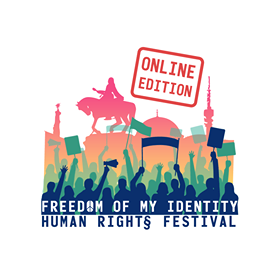 Diverse Youth Network has therefore decided to come up with an adaptive response that we look forward to bringing online in May 2020, by organising an online festival: ’Freedom of my Identity Human Right Festival – Online Edition’. In partnership with Radio Shun.es and its online technical assistance, the Diverse Youth Network’s online edition of the Festival will take place from 14 to 16 May 2020, with 7 different programmes: 1. Gender roles in the Roma communities; 2. Trianon realities; 3. From hate crimes to genocide!; 4. Feminism post-COVID 19; 5. Romani Resistance – May 16; 6. Religion and LGBT; 7. Trans rights – human rights; 8. Pécs Pride Solidarity Party Online.
Diverse Youth Network has therefore decided to come up with an adaptive response that we look forward to bringing online in May 2020, by organising an online festival: ’Freedom of my Identity Human Right Festival – Online Edition’. In partnership with Radio Shun.es and its online technical assistance, the Diverse Youth Network’s online edition of the Festival will take place from 14 to 16 May 2020, with 7 different programmes: 1. Gender roles in the Roma communities; 2. Trianon realities; 3. From hate crimes to genocide!; 4. Feminism post-COVID 19; 5. Romani Resistance – May 16; 6. Religion and LGBT; 7. Trans rights – human rights; 8. Pécs Pride Solidarity Party Online.
These events are vital for people to feel accepted and visible in their communities, as well as serving as starting points of important social discussions.
For many Roma, Covid-19 is worsening dire living conditions
Anja Reuss, Zentralrat Deutscher Sinti und Roma, Germany
01 April 2020
Right-wing extremists and nationalist politicians in many parts of Europe are trying to use the current crisis caused by the Coronavirus to legitimise and implement racist positions as government regulations. This affects Roma and other racial minorities in particular.
Vulnerable communities should be the first target of humanitarian assistance in the current crisis and the European Commission should call on authorities to not forget Roma and distribute humanitarian aid to them.
The EU Roma Framework failed to make any impact on the disastrous living conditions of many Roma families. Still there are segregated and overcrowded settlements and camps, often located in close proximity to toxic dumps, or on remote sites without basic infrastructure or even access to water. In these conditions, which weaken immune systems of young and old, the strict hygienic rules needed to prevent the spread of COVID-19 become a challenge for marginalised communities. Instructions to “wash your hands” are meaningless if there is no access to water. What’s more, many Roma lack access to health services and regularly experience discrimination in healthcare, and this is unlikely to change in times of coronavirus.
Whether motivated by rumours or just plain racism, attacks on Roma people are increasing. In Bulgaria, authorities introduced restrictive measures, confining Roma people to ghettos and prohibiting them from “mingling” with the rest of the population. After Roma workers returned from western Europe they were accused of bringing the virus to the country.
Antigypsyism and a lack of opportunities have kept Roma out of the labour market well before the coronavirus crisis, and forced many to move abroad to find work. These days, the odds of making a living are even worse and their sources of income have all but disappeared. Indeed, tens of thousands of Roma make their living through precarious self-employment, working in the informal sector or toiling as daily labourers, activities which are no longer possible in the current situation. The travel ban to EU member states is also cutting many Roma families off from an income.
Home schooling brings additional challenges. Many Roma families have no internet, computer or electricity. But even with access, remote education is difficult in confined living spaces. At the same time, Roma parents who may themselves be illiterate are unable to help with home schooling. It is feared that many Roma children will lose an entire school year or drop out of education altogether.
For us it is important now to continue raising awareness, identifying needs and targeting assistance. The Central Council is closely monitoring current developments and advocates for urgent steps to improve the situation of Roma and Sinti, in particular to help families economically. Roma civil society organisations are trying to raise awareness of the virus within local communities and provide information about aid services and opportunities for state relief.
Lockdown reality for Latin American women in Belgium
Thamara Cruz, SIEMPRE, Belgium
30 March 2020
Since the lockdown started in Belgium, staying healthy has become the priority, and containment measures require people to stay at home, except for essential needs or work that cannot be done from home. For some women of Latin American and Caribbean origin, staying at home in “contingency” doesn’t make much difference in their lives. Their reality before the coronavirus crisis was already staying at home for months, taking care of their children while searching for a job – writing motivation letters, CV’s, making calls, most of the time without a positive response, trying to regularise their stay in Belgium, learning one of the official languages. Some in case of divorce do not have enough resources to return to their countries of origin or cannot keep the custody of their children. Some are experiencing different kinds of violence and discrimination and do not report them, causing them to remain at home for long periods. Those who live in rural areas with little access to public transport or who care for babies or children with disabilities face even more isolation.
As a result, it’s on social media that they are able to network, share opinions and exchange tips, on the basis of shared situations and experiences as migrant women. Social media groups are organised by topic, diasporas, or debates and try to solve recurrent problems. This social work of guiding and accompanying a migrant population is the result of social and collective participation that has been self-organised, in the shadow of institutions. The need to be listened to, to find information about regularising their stay, job search, health, what to do and where to go when they face violence, to get recommendations from experts, promotion of events and products are some of reasons Spanish-speaking diasporas use social media networking.
The Covid-19 crisis shows us how social and health services are confronted with rapidly increasing numbers of patients including migrants, women with children, women experiencing violence and isolation. But the system in place ignores their circumstances. Social and health services are not prepared to provide child protection or offer immediate solutions and access to women who are undocumented. They also often not suited to understand and meet the needs of migrant women.
We are changing as a society; we have to transform together in this spring of confinement, and ensure that everyone’s health is a priority.
The impact of Covid-19 on asylum seekers
Jasmine Joelle Tsimi Abega, Migrabo LGBTI, Italy
24 March 2020
The spread of the COVID19 virus is a global emergency now. Governments have put in place measures to have as few infections as possible. Those who break these rules face serious penalties.
From a legal point of view, measures have been envisaged for asylum seekers in Italy that affect some aspects of the procedure for the recognition of international protection for those who break the rules.
From an administrative point of view, the offices of police stations and territorial commissions are closed until further notice. This means no renewed residence permit for those who were already working. It seems that the life of the asylum seeker has stopped. A double burden to bear compared to all other citizens.
From a social point of view, the coronavirus prevents mobility except for essential needs, and the operators who deal with asylum seekers are no longer able to guarantee their presence in structures for asylum seekers. In addition, it becomes difficult to provide basic sanitation material and moral support.
It seems that no measures are implemented to date to safeguard health and decrease the possibility of contagion among the residents of reception facilities for asylum seekers and refugees.
This epidemic represents – as the UN Refugee Agency (UNHCR) underlines – a global challenge, and can only be faced by ensuring solidarity and cooperation on an international scale. For this reason, the answer must include and focus on the needs of each individual, including those forced to flee their homes.
The situation for migrants and refugees in Greece
19 March 2020
Ahmed Moawia, Greek Forum of Migrants
We are deeply concerned about the way Greece and the European Union are handling the refugee and migration issue. We ask that as a matter of shared responsibility among EU member states, the current situation in the Greek islands and north borders should be treated as it is, a European issue. The right to asylum and the respect for human rights must be protected. With the Covid-19 pandemic we should take extra care of all vulnerable people.
Thus:
• EU Member States should immediately relocate refugees and asylum seekers -especially families with children and unaccompanied minors – from the islands of Greece to the mainland and to other Member States
• The EU should revise the EU-Turkey Agreement.
• EU Member States should refrain from stigmatising some countries as being responsible for the Covid-19 pandemic.
We must act with solidarity for all.
Maddalena Avon, Centre for Peace Studies, Croatia
National governments, in particular in Greece, must consider using public and private empty buildings to accommodate people in overcrowded refugee camps and asylum seeker centres, in order to ensure basic health services and proper hygienic living conditions to inhabitants. EU and national governments should also ensure solutions for all those refugees finding themselves in unstable and unsafe situations at the external borders of the EU.
Solidarity and community based responses
Karen Taylor, Chair of the European Network Against Racism
19 March 2020
To overcome this crisis, we urgently need community-based responses. We need to revive the power of the collective to resist individualism and isolation, and use the time we have to organise solidarity actions. We must continue to organise for justice and make solidarity contagious within our own communities. In addition, EU Member States should adopt comprehensive national action plans against racism as a way to address structural racism and discrimination.


